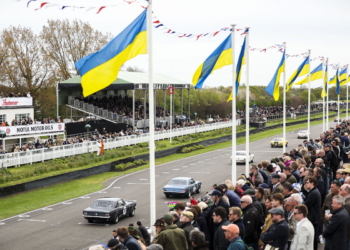So I’m just getting the Green Notebook done for Silverstone, as I sit in the Media Centre for the next race at Silverstone and, to be honest, I’m wondering if I won’t be doing the same again in week from now.
Next week we are supposed to be in Catalonia, in Spain, but anyone who keeps an eye on the world will know that Spain – and Catalonia in particular – is in the grips of what must be viewed as a potential second wave of the virus. I keep an eye on the numbers each day and it has gone up significantly and is now running at around 3,000 new cases a day. But then on Tuesday it spiked to 5,760, although this was apparently due to “technical issues” which meant that some communities were not added to the national total in previous days. Yesterday it was back to 3,000 again. Still, it is a little worrying for F1, although it is very clear that the circus is going to go unless the Spanish (or Catalan) government stops them. F1 is clearly keen to keep moving.
However, the other thing that needs to be watched is if the French decide to shut the border, which would make it impossible for F1 to get to Spain in the time available. You might say: ‘Does it really matter?’ but in this particular case it does a little because without the Spanish Grand Prix we will end up at Mugello on September 13 for the Gran Premio della Toscana Ferrari 1000 event, which will be Ferrari’s 999th Grand Prix… which would be a bit of what an F1 PR person would call “non-optimal nomenclature”, but the rest of us would call a cock-up. I did ask Silverstone boss Stuart Pringle if they could do three races in a row and he said that it was entirely possible if they were to cancel a national Formula 3 meeting that is scheduled. Hopefully, it won’t come to that…
When you stop and think about it, and look at the big picture, one can only conclude that Formula 1 has done a terrific job in the first four races this year. It has created a very professional-looking show – not so very different from normality – and while Mercedes may be ahead of the game, there is no shortage of things to write about.
My favourite story at the moment is the glorious irony of Mercedes-Benz domination.

“We were pushed by some of our competitors [read Ferrari] to absolutely new levels,” Toto Wolff said. “It brought us to almost burnout last year, to develop and innovate in a way to be competitive on track. And here we go, I think we made a substantial jump in performance from 2019 to 2020. Because we needed to last year. That is a little bit ironic for me.”
Ironic, because Ferrari’s performance has fallen away following the controversy over fuel-flow sensors which was concluded with a secret settlement which the FIA agreed with Ferrari in the winter – and announced to the world. You could not make this stuff up. Announcing a secret settlement. It’s genius. It is rather like ordering Ferrari to run its cars in a dayglow yellow livery in the knowledge that even the most obtuse observers are going to ask why such a thing is necessary.
Mercedes has accelerated away because it felt under threat and dug even deeper and Ferrari has lost its pace because… Well, not’s finish that sentence.
There are inevitably some people who say that Mercedes winning all the time is not very interesting, but I’m afraid I don’t agree with them – just as I hate the concept of reversing grids, which mean that undeserving people win races. When it comes to Formula 2 and Formula 3, I always check if someone says they have won races because the reversed grid races have no value to me. F1 is an entertainment, but it is primarily a sport and gimmicks to make things more interesting cheapen the whole thing. F1 should not be kowtowing to people who need instant gratification because they have the attention spans of confused gnats. The finer things in life usually involve a degree of patience and an appreciation of subtlety. Michelin star restaurants aren’t known for their drive-through.
Still, nothing is new under the sun and this was a topic that came up in the 1930s when Mercedes technical director Max Sailer, who had been a member of the famous Mercedes driving team of 1914, rejected similar claims that Mercedes was too dominant.
“We cannot help them (the opposition),” he said. “Mercedes-Benz has been winning races for 40 years and we don’t propose to stop now.”
The only way to change the situation is to get the rival teams to help themselves. To be fair, while Ferrari has been falling over its own bootlaces, Racing Point have been rather clever by helping themselves to the Mercedes concept and reverse-engineering a competitive car… by taking photographs of an existing product and working backwards, figuring out how it works and then building something that does the same thing but using different ways to achieve it. It is easy to say it’s a pink Mercedes, but clearly that is not the case, otherwise the FIA would have to announce another secret agreement…
Anyway, I think things are going remarkably well for F1 this year and while one cannot be sure that will still be the case next week, it is putting on a decent show and entertaining people.

One might argue that no form of entertainment or sport is essential or important in the overall scheme of things. There are some things which are essential: food, drink, shelter and sleep are fairly obvious but after that there are concepts such as interaction and entertainment. Living is a stressful business and people need to relax and being entertained in a passive way (ie watching TV or films, listening to the radio or to music, reading books or looking at art or sporting contests) is very effective . In recent years medical researchers, academics and psychologists have begun to investigate the importance of entertainment and have found that it all boils down to a neurotransmitter called dopamine, which helps humans cope with new things. This is generated by entertainment and provides us with drive, focus and motivation. These in turn provide satisfaction and a sense of well-being, and those who are insufficiently supplied with dopamine tend to be listless and lacking in energy. The conclusion is that we all need things to keep us amused.
And thus, sport in the time of Covid-19 is probably more important than we think. To be fair, that is not why it is happening – profit is the key to that – but it is interesting to reflect that there is a role to be played, although one can argue, I suppose, that virtual motor racing has been doing that.
Anyway, Formula 1 has managed to host races in different countries and protect not only the locals but also those taking part, thanks to the biosphere concept that it created, with the different players keeping (as much as possible) to their different “bubbles”. It isn’t easy to do and from what I hear there are a few people who are playing fast and loose with the rules although, as Bernie Ecclestone always used to say, it isn’t cheating unless you get caught. It would be quite interesting to see what the FIA would do if it was to stumble across two team bosses, for example, meeting outside the paddock, breaking their respective bubbles. But then, of course, for such things to be found the FIA folk would logically need to be operating outside their own bubbles… or there would need to be whistle-blowers. In the circumstances I don’t have a problem with such activities as bubbles are there for our protection and those who disrespect the rules and actually just disrespecting other people, a la Cummings. There shouldn’t be one rule for movers and shakers and another for the mokes.
I have to admit that after four races of not being allowed into the F1 Paddock I am a little bit frustrated but I’ve decided that I am going to go to every race (if I can) because that is what I do. I suggested to the other day that I would be happy to do a PCR test every day if they would let me go into the paddock. You get used to these things if you are having one every four days.
The result of all this is that the news tends to be uniform, as there are no snippets – or at least very few of them. And without fans the atmosphere at races is completely different.
“When I come to my home race, the thing I most look forward to is seeing all the fans,” Lewis Hamilton said during the first Silverstone weekend. “So it was a very odd drive up here, because that’s what you expect to see the closer you get to Silverstone, and this year of course there are no fans.

“There are corners here that you go around and there’s a split second when you get to see and appreciate the crowd out of the corner of your eye, the flag waving, the clapping and cheering. And now there isn’t going to be any of that. It’s going to be a lonely weekend without them, without that energy that they bring.
“I think that it’s part excitement and also nerves when you come to this race, knowing how many people do come. And that nervousness is just really through wanting to excel and deliver for everybody, because you go on a pretty incredible journey together. And so I try to keep that in mind still this weekend; whilst I didn’t have that same feeling coming, knowing that no-one’s going to be here, I just really tried to remember the last years and try and somehow get that energy and utilise it.”
There are, of course, weird advantages that come as a result of the lack of fans. We could get into and out of the circuit without a problem. That was weird and it affected everything because our timetables were suddenly very different. You did not have to get up at the crack of dawn to avoid the traffic jams. And you could leave and simply drive out, without needing to worry about time being wasted in queues. It also gave one time to appreciate more than just the race track activity. Normally at Silverstone one spends an awful lot of time trying to get from one end of the paddock to the other, because one is always bumping into someone who has been around at some point in your story – and ignoring them is very difficult and can be seen as rather rude. This year, with no access to the empty paddock, there has been plenty of time for thinking and the thing that struck me most over the first weekend was the fact that Silverstone is changing for the better with each passing year. And the story is far from over. Back in 2007 the track announced its masterplan to “release the value” of the land and thus provide a way of raising the finance to keep everything in good order. I dug around a bit in the dusty corridors of my computer and found the original Masterplan document, which was very interesting. It hasn’t all turned out as planned, but there remains a lot that can – and will – be done. In that document there was more than one hotel and also an Advanced Technology Park, in addition to the business park currently being built, in order to allow Silverstone to diversify the site beyond motor racing.
There was an extreme sport and leisure complex, broadening the range of activities available with plans for karting, climbing walls, BMX parks, skate facilities and so on.
There was also an external Silverstone Arena for open air events, concerts and auctions. It is all there is the document and I guess that at least some of it will eventually be developed.
It will be interesting to watch in the years ahead…








